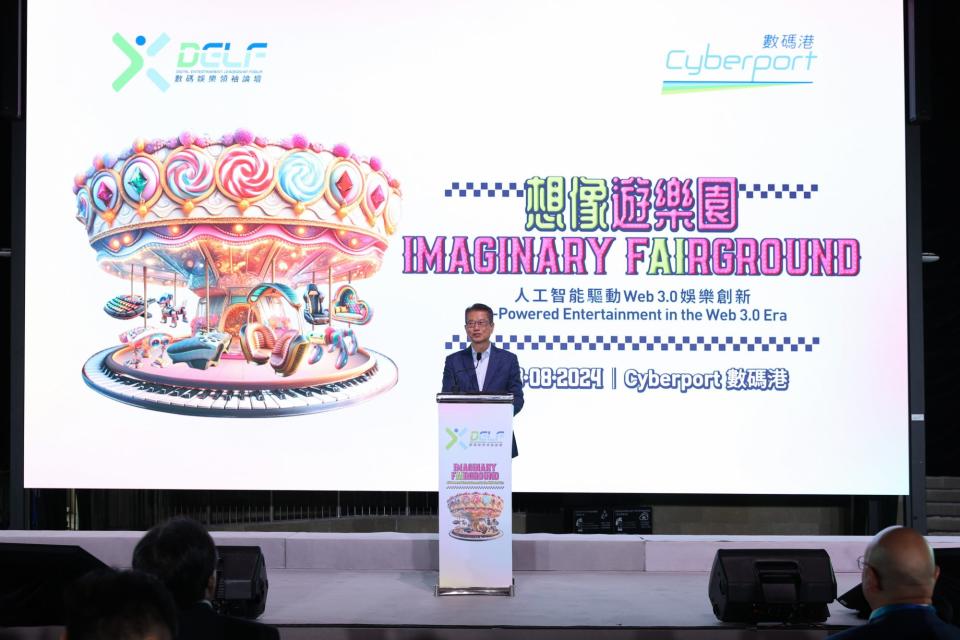Hong Kong's video gaming sector to get a boost from growing adoption of GenAI
Growing adoption of generative artificial intelligence (GenAI) could help empower the video gaming industry in Hong Kong, according to delegates at this year's edition of the Digital Entertainment Leadership Forum at tech hub Cyberport on Friday.
"We have seen the trend that users are more willing to interact with AI, which means virtual characters are an important direction in the entertainment and gaming industry," Zhang Ji, a senior algorithm engineer at Alibaba Group Holding's Institute for Intelligent Computing, said at a panel discussion at the three-day forum, which concludes on Sunday. Alibaba owns the South China Morning Post.
GenAI refers to algorithms used to create new content including audio, code, images, text, simulations and videos. Recent breakthroughs in the field, such as OpenAI's ChatGPT and Sora, have the potential to radically change the way gaming developers approach content creation.
Do you have questions about the biggest topics and trends from around the world? Get the answers with SCMP Knowledge, our new platform of curated content with explainers, FAQs, analyses and infographics brought to you by our award-winning team.
In the past, users only had three to five rounds of conversation with AI, according to Zhang. But with advances in GenAI, including long-text prompts and high-bandwidth memory, Zhang said users now tend to have more than 100 rounds of conversation with AI.
"With AI-enhanced efficiency in the field of games, we can generate a lot of material and dialogue content," Zhang said. "By leveraging GenAI, we can also create new types of games that we weren't able to do in the past."

Hong Kong Financial Secretary Paul Chan delivers his keynote address at the opening of the Digital Entertainment Leadership Forum 2024 at tech hub Cyberport on Friday. Photo: Handout alt=Hong Kong Financial Secretary Paul Chan delivers his keynote address at the opening of the Digital Entertainment Leadership Forum 2024 at tech hub Cyberport on Friday. Photo: Handout>
That development stands to benefit Hong Kong, as part of the Greater Bay Area, to burnish its credentials in AI-powered entertainment.
"Generative AI is reshaping gaming development, reducing costs, and empowering artists and innovators to create more enriched, personalised and immersive experiences for consumers," Paul Chan Mo-po, the city's Financial Secretary, said in his opening remarks at the forum.
Chan said the Hong Kong government is "actively supporting digitainment development", including those at Cyberport - "home to more than 160 digitainment companies, over 250 Web 3.0 firms and over 200 AI and big data-related start-ups".
"We are also building an AI Supercomputing Centre, and our target is to commission its first-phase facilities later this year," Chan said. "In this year's government budget, we have announced a subsidy scheme to support local universities, research institutes and business enterprises to use the centre's computing power."

Generative artificial intelligence is expected to help reshape video-gaming development. Photo: Handout alt=Generative artificial intelligence is expected to help reshape video-gaming development. Photo: Handout>
With the growing adoption of GenAI, tools and resources that used to be only available to major video-gaming companies are now accessible to small firms and individual developers.
"AI has democratised the development of gaming," Warren Cho, worldwide gaming vertical leader at Microsoft, said in his keynote speech.
He pointed out that Microsoft's ChatGPT-enhanced Bing search engine is already being used to create 2D and 3D animation in the video gaming industry.
Still, the high cost of deploying AI tools remains an obstacle for smaller game developers.
Large language models (LLMs) - the technology underpinning GenAI services like ChatGPT - can help power creativity and productivity, but "the cost is relatively high", Zhang said, noting that it has made some enterprises delay adoption of AI tools.
Zhang said Alibaba has worked hard to reduce the cost of using AI, as its Tongyi Qianwen family of LLMs have gone through price cuts this year. As such, these LLMs have been adopted by mainland developers to create various novel games. These models have already been adopted by more than 90,000 corporate clients on the mainland, according to Alibaba.
Meanwhile, Baidu is looking to know more about the AI requirements of companies in Hong Kong. "Right now we are cooperating with partners from all sectors in Hong Kong to learn their needs," Shi Wei, Baidu's general manager for Hong Kong and Macau, said on the same panel with Alibaba's Zhang.
Shi also mentioned plans by Baidu to open an LLM centre in the city.
This article originally appeared in the South China Morning Post (SCMP), the most authoritative voice reporting on China and Asia for more than a century. For more SCMP stories, please explore the SCMP app or visit the SCMP's Facebook and Twitter pages. Copyright © 2024 South China Morning Post Publishers Ltd. All rights reserved.
Copyright (c) 2024. South China Morning Post Publishers Ltd. All rights reserved.